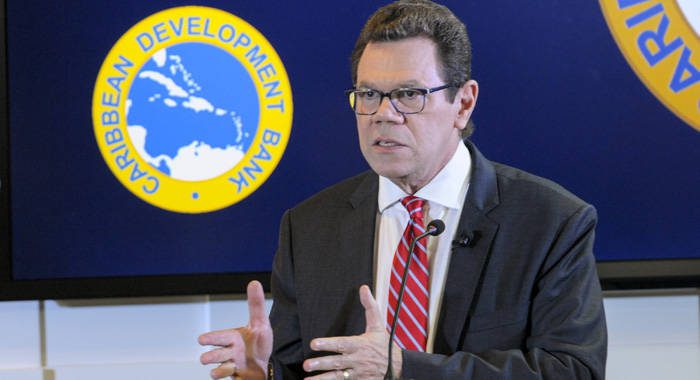By Kenton X. Chance
PROVIDENCIALES, Turks and Caicos Islands — The Caribbean Development Bank (CDB) on Wednesday warned that inward-looking economic policies in some developed countries threaten the achievement of the Sustainable Development Goals (SDGs), and urged Caribbean government to craft “bold and innovative strategies” to ensure that progress towards the 2030 SDGs remains on track.
The SDGs, adopted by countries in September 2015, a set of goals to end poverty, protect the planet, and ensure prosperity for all as part of a new sustainable development agenda. Each goal has specific targets to be achieved over the next 15 years.
But Warren Smith, president of the CDB, told the opening ceremony of the bank’s 47th annual board of governors meeting that the prolonged period of weak international economic performance has contributed to the growing discontent with the inequitable distribution of costs and benefits of globalisation and international trade.
“This trend has strengthened the appeal of protectionism and inward-looking policies in several developed countries,” he said.
Smith said that in the face of this emerging reality, an appropriate response for Caribbean countries would be that that “as they turn inward, we must turn outward”.
“Our focus must now be on fully exploiting the opportunities for deepening trade and investment within existing and new regional markets. That is, CARICOM must become the stepping stone to penetrating those non-CARICOM markets which still recognise international trade as a powerful underpinning for dynamic economic growth.”
Smith noted that the Caribbean Community (CARICOM) Single Market and Economy (CSME), which is just over 15 years old, is designed to promote the development of the region through economic integration, functional and regional security cooperation, and foreign policy coordination.
Functional cooperation predates CARICOM and is, perhaps, the best illustration of the value of a regional approach to development,” he said.
“The takeaway, here, is that the benefits that have accrued to member states, especially from functional cooperation in health, education, security, disaster mitigation and in the provision of common services across a wide range of human and social activity, have been significant and, most importantly, sustained.”
The furtherance of functional cooperation and the enhancement of the provision of common services are most relevant within the context of the fiscal crisis confronting a number of Caribbean governments, Smith said.
He, however, said that improving functional cooperation will not, on its own, resolve the development challenges facing the region.
“Our economies need to grow; and they need to do so in a sustained way,” he said, adding that for this growth to take place, the highest priority must be given to improving the competitiveness of regional economies through building a business-friendly environment.
“In that type of environment, enterprises will be incentivised to invest in productivity enhancing employees and technologies, thereby enabling them to engage in regional and international trade,” he said.
Smith said that in giving real meaning to “when they turn inward, we turn outward”, the Caribbean must realise that “trade” refers to the exchange of goods and services, not just merchandise trade.
“Caribbean tourism is the largest earner of foreign exchange, and the biggest employer of local and regional labour in most CARICOM countries. Tourism is a service industry, which requires a vast array of inputs in order to meet the needs of its customers.”






